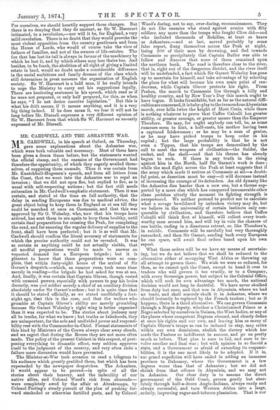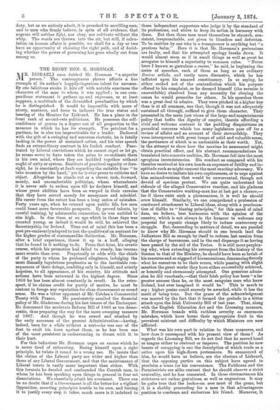MR. CARDWELL AND THE ASHANTEE WAR.
B. CARDWELL, in his speech at Oxford, on Thursday, .1.11. gave some explanations about the Ashantee war, which were both valuable and necessary. Most of them have been given a dozen times before, but the statements wanted the official stamp, and the enemies of the Government had therefore the opportunity, of which they eagerly availed them- selves, of supposing them unmade. Thus it was certain from Mr. Knatchbull-Hugessen's speech, and from all letters from the Coast, that we went into the Ashantee war to repel an invasion ; that we did not open fire, but replied to fire, as is usual with self-respecting nations ; but the fact still needs reiteration in Mr. Cardwell's emphatic statement. Then it was certain, and stated at the time on full authority, that the delay in sending Europeans was due to medical advice, the great object being to keep them in England or at sea till they could be marched at once on Coomassie, and that this was approved by Sir G. Wolseley, who, now that his troops have arrived, has sent them to sea again to keep them healthy, until certain final preparations for crossing the Prah, for completing the road, and for ensuring the regular delivery of supplies to the front, shall have been perfected ; but it is as well that Mr. Cardwell should confirm the literal accuracy of statements for which the precise authority could not be revealed. It was as certain as anything could be not actually visible, that all needful preparations would be made to answer an expected demand for a European brigade ; but it is pleasant to know that these preparations were so com- plete, that within forty-eight hours of the arrival of Sir Garnet's despatch—which, as rumour runs, took some time merely in reading—the brigade he had asked for was at sea. And, finally, it was certain that Captain Glover, though vested with unusual powers, especially with powers to pay his levies decently, was qua soldier merely a chief of an auxiliary division absolutely under Sir Garnet's orders ; but it is quite time that it should be stated officially, as we stated unofficially a fort- night ago, that this is the case, and that the writers who grumble at Captain Glover's ability are merely grumbling because Sir Garnet Wolseley's right wing is better organised than it was expected to be. The stories about jealousy may all be truths, for what we know ; but truths or falsehoods, they are unimportant, for the sole and undivided power and responsi- bility rest with the Commander-in-Chief. Formal statements of this kind by Ministers of the Crown always clear away clouds, and we regret that during the Recess they are not more often made. The policy of the present Cabinet in this respect, of post- poning everything to dramatic effect, very seldom approves itself to the judgment of the country, and very often risks a failure more discussion would have prevented.
The Minister-at-War took occasion to read a telegram to his audience which greatly gratified them, but which has been superseded by the newspaper despatches. The Ashantees it would appear to be proved—in spite of all the stories about their bravery, and the imbecility of our native allies, and Colonel Wood's risk from abuscade- were completely awed by the affair at Abrakrampa, by Colonel Festing's steady pursuit of the plan of pushing for-
Wood's daring, not to say, over-daring, reconnaissances. They do not like enemies who stand against armies with fifty soldiers, any more than the troops who fought Clive did—and who included thousands of Rohillas, at least as brave as Ashantees,—and at last, moved probably by some false report, flung themselves across the Prah at night, losing 300 of their men by drowning, and fled towards Coomassie so precipitately that Captain Butler was able to follow and discover that none of them remained upon the northern bank. The road is therefore clear to the river, that is, right out of the dangerous district, and the river itself will be undefended, a fact which Sir Garnet Wolseley has gone up to ascertain for himself, and take advantage of by selecting the place for what will become his own main point of ren- dezvous, while Captain Glover protects his right. From Prahsu, the march to Coomassie lies through a hilly and healthy country, and by New Year's Day this march ought to have begun. It looks formidable, but as far as the natural diffi- culties are concerned, it is baby-play to the tremendous Abyssinian march, over bills twice the height of Mont Cenis, while there is nothing whatever to prove that Caffee Calcalli has greater ability, or greater courage, or greater means than the Emperor Theodore. He may, for aught anybody can tell, be, as some rumours seem to hint, a half-caste, his mother having been a captured Irishwoman ; or he may be a man of genius, or he may have picked troops to keep order in his capital ; but the large probability is that he is not even a Tippoo, that his troops are demoralised by the call to meet the weapons of civilisation—the Snider, the rocket, and the shell—and that his throne has already
begun to rock. If there is any truth in the rising against him in the North, half Sir Garnet's work is done ; while the mad flight across the Prah at least suggests that if the army which made it arrives at Coomassie at all—a doubt- ful point, as desertion must be easy—it will decrease instead of increasing the courage of its defenders. An old dynasty like the Ashantee dies harder than a new one, but a throne sup- ported by a mere clan which has conquered innumerable other clans perishes utterly the moment its fighting strength is overpowered. We neither pretend to predict nor to calculate what a savage bewildered by unbroken victory may do, but we believe in the universality of certain instincts only con- querable by civilisation, and therefore believe that Caffee Calcalli will think first of himself, will collect every trust- worthy man around him, and will try in vain the chances of one battle, ending in a disastrous retreat, or, like Theodore's, in suicide. Coomassie will be carefully but very thoroughly ransacked, and then Sir Garnet, sending back every European he can spare, will await final orders based upon his own report.
What those orders will be we have no means of ascertain- ing, but we do not believe that we shall be reduced to the alternative either of occupying West Africa or throwing up all attempt to govern there. We wish we were so reduced, for then, as we cannot quit the Coast, except to hand it over to traders who will govern it too cruelly, or to a Company, with every Sovereign power, but subject to the Colonial Office, which will seek its own advantage too much, the national decision would not long be doubtful. We have never skulked from duty but once, and that was in Abyssinia, where we had no trade, and shall scarcely skulk it in Ashantee, where we should instantly be replaced by the French traders ; but as it happens, there is a third alternative. We can govern Coomassie
through a Negro deputy, whether a Christianised Prince or a Negro selected by ourselves in Guiana, the West Indies, or any of the places where competent Negroes abound, and clearly define at once his rights and our own, and leaving him as many of
Captain Glover's troops as can be induced to stay, may retire within our own dominions, abolish the slavery which has made the Fantees so indifferent to success, and go on pretty much as before. That plan is sure to fail, and sure to in-
volve another and final war ; but with opinion in so flaccid a state, and a Government so afraid of extending its responsi-
bilities, it is the one most likely to be adopted. If it is, our grand expedition will have ended in adding an immense province to Dahomey, where the Government is a few degrees worse than that of Ashantee ; but we did not shrink from that offence in Abyssinia, and we may not in Ashantee. Our clear duty is to assume the direct government of the Gold Coast, govern gently but abso- lutely through half-a-dozen Anglo-Indians, always ready and always successful, and turn Western Africa into a large, duty, but as we entirely admit, it is preached to unwilling ears, and to men who firmly believe, in spite of all evidence, that negroes will neither fight, nor obey, nor cultivate without the whip. The words are thrown into the air, but still, if calcu- lation on human affairs is possible, we shall for a day or two have an opportunity of choosing the right path, and of decid- ing whether the power of governing has gone wholly out from among us.











































 Previous page
Previous page